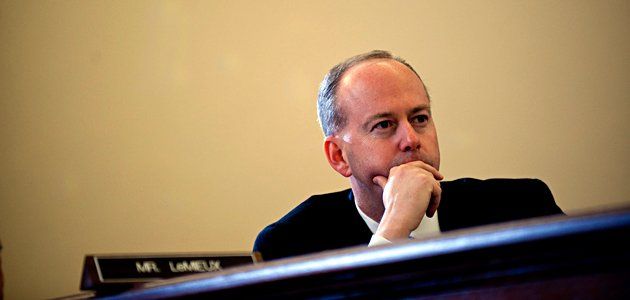
Come January, the faces of 34 U.S. senators will be wreathed with "six-year smiles"—the carefree look of those whose next election is agreeably distant. Sen. George LeMieux, 41, the Florida Republican, will be gone then, but for now he has the smile of a man content to be going home to four children, ranging in age from 7 months to 7 years. His smile is, however, tinged with melancholy about important work interrupted.
He became a senator when Gov. Charlie Crist appointed him to complete the term of Mel Martinez, who resigned in August 2009. Crist, intending to seek that seat in 2010, picked LeMieux, his former chief of staff, as a place holder. Crist did not reckon on 2010's wunderkind, Marco Rubio, who is now senator-elect. LeMieux says leaving is "bittersweet," in part because senatorial "graciousness" survives even today's partisanship. So in 2012 he might run against Sen. Bill Nelson. This is probably unprecedented—two Senate colleagues from the same state anticipating a contest for a Senate seat in the next cycle.
If LeMieux does run, his slogan might be: "On to 2007!" That was, he says, "the last good year," and he asks: Would it result in grinding austerity for government to live for a while as it did then? He says that if federal spending were held at the 2007 level for 10 years, the budget would be balanced in 2013 and the national debt, currently $13.7 trillion, would be less than $7 trillion in 2020, with annual savings of hundreds of billions in debt-service costs. Absent action, he says, interest payments in 2020 on a debt of $26 trillion will be $900 billion.
Today, he says, the government's gross receipts are sufficient only to cover entitlement programs: "For every other function, we're borrowing." Among the conclusions LeMieux has come to during 15 months on Capitol Hill is this: "In perhaps no other place in the world is money spent by an organization without any reference to how much money is taken in." And: "I don't think anyone in Washington knows what we are spending money on." And: "There is no mechanism to know what the 100,000 people in the Agriculture Department are doing, or whether they are doing it effectively."
He is not singling out Agriculture for special blame; his point is that this department is not singular, that the absence of meaningful metrics afflicts almost all aspects of government. And he thinks such pervasive unreality in government requires bolder reforms than are being discussed.
Some Republican leaders favor rolling back—only to 2008 levels—only domestic discretionary spending, exempting homeland security and veterans' programs. Michael Tanner of the Cato Institute says this would exempt 83 percent of the budget and cut only 2.8 percent of federal spending, reducing it from 24.3 percent of GDP to 23.6 percent.
Erskine Bowles and Alan Simpson, co-chairs of the deficit-reduction commission, recently suggested raising the age of eligibility for full Social Security benefits to 69—by 2075. Sixty-five years is forever. Sixty-five years ago, Bing Crosby was the bee's knees, 12-year-old Elizabeth Taylor starred in National Velvet, and the Cubs were in the World Series. If in 1935, when Congress created Social Security with a retirement age of 65, Congress had indexed that age to life expectancy, that age would now be in the mid-70s.
Florida, a.k.a. God's Antechamber, is home to many retirees from elsewhere, but LeMieux thinks the elderly no longer recoil from candor about the welfare state, the primary function of which is to subsidize the retirements and health care of seniors. He notes that Rubio discussed various possible Social Security changes and won by 19 points.
Florida, which is ground zero for housing foreclosures and has an 11.9 percent unemployment rate, swung to the right on Nov. 2, producing record Republican majorities in the state legislature. LeMieux's home is in Ft. Lauderdale, in Broward County, which has a population about the size of Nebraska's. When the economy recovers, Florida will replace New York as the third-most-populous state. As a result of the 2010 census, Florida, the most important swing state in presidential politics, will in 2012 probably get two more congressional seats—and electoral votes. Exactly 10 years ago, the nation's attention was riveted by Florida's hanging chads and other excitements of the Bush-Gore election. Twenty-three months from now, the presidency could hang in the balance as Floridians weigh the kinds of policies LeMieux advocates.
Uncommon Knowledge
Newsweek is committed to challenging conventional wisdom and finding connections in the search for common ground.
Newsweek is committed to challenging conventional wisdom and finding connections in the search for common ground.





